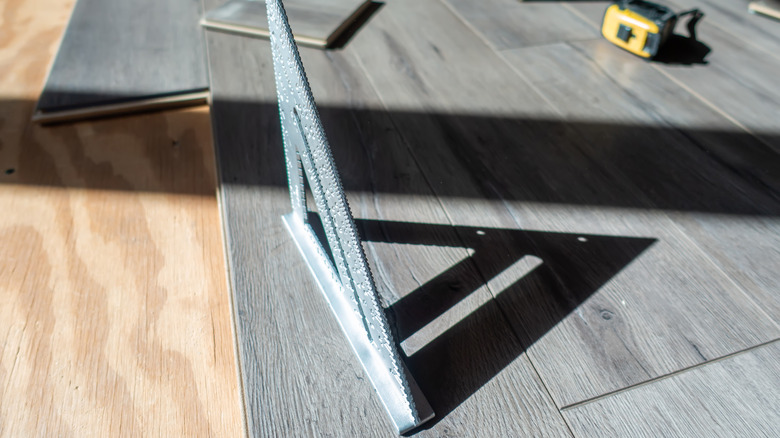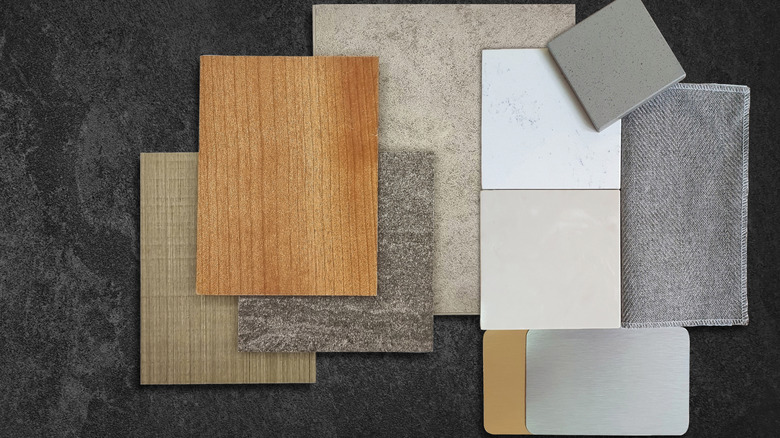Drawbacks To Engineered Hardwood Flooring To Consider Before Installing
We're about to tell you some things that won't make your jaw drop. No one will be stunned to find out that engineered hardwood flooring isn't as good as solid hardwood, that it's not invulnerable to damage, or that it's more expensive than — wait for it — cheaper options. It is, nonetheless, important to understand these and many other things if you're considering engineered hardwood because the stuff might be 100% perfect for someone, and almost entirely the wrong choice for you. Moving past the marketing hype and understanding things on a commonsense and personally applicable level will help you make the wisest flooring purchase... which might very well be engineered hardwood.
A lot of what are thought of as advantages or drawbacks only exist relative to other flooring options, and that's by design. When you compare laminate and hardwood flooring, for example, you expect each to have some advantages over the other. Bringing a product to market that is inferior in every way, including price, would be nonsensical. A good starting point is figuring out what you care about most, whether that is price, safety, or durability. There are so many flooring options, these days, that any list of the best flooring materials would contain a lot of alternatives, and at the right price point and from the right manufacturers, they're all pretty decent. Start by figuring out which version of "pretty decent" you care the most about.
The downsides of most engineered hardwood
The downsides of engineered hardwood flooring — often trumpeted by those who make more money when you buy more expensive flooring — can read like a litany of the obvious. Engineered hardwood is, fundamentally, a veneered plywood. That is, a plywood core composed of multiple layers of wood products glued together is also bonded to a wear layer of hardwood that gives the flooring its refinish-ability and its resistance to damage during normal use.
While plywood is typically very dimensionally stable, it also works best as a full sheet rather than as much smaller planks. So, it must be acclimated before installing, and it is vulnerable to delamination and other failures if it gets wet enough for long enough. Old-school flooring salespeople and installers might balk at this idea, but it's a fairly low-risk proposition to install solid hardwood in a kitchen. Installing an engineered product in your kitchen, on the other hand, is more likely to prove a bad idea. And with a wear layer as thin as 2mm (just over 1/16 inch), you'll obviously get fewer refinishing opportunities from engineered wood compared to solid hardwood.
So, we've established that engineered hardwood isn't as good as hardwood in these respects. It also falls short of other flooring in other areas. It's not as dent-resistant as vinyl, nor as inexpensive as laminate. When it's not cheaper, you have a well and truly cheap engineered floor, which is more likely to off-gas formaldehyde, to sound hollow, and be made up of narrower boards.
The downsides or upsides of engineered hardwood really depend on what angle you're looking at this from
With most of the "problems" of engineered hardwood, there is a continuum in which the products fare worse than some flooring options and better than others. You can refinish engineered floors fewer times than hardwood, for example, but more than laminate (which can be refinished zero times). And engineered hardwood is less susceptible to being damaged by water than laminate flooring, which can be ruined by a full glass of water, but more susceptible than vinyl flooring, which is almost completely invulnerable to moisture.
Price is usually the factor that locates any particular product on the continuum. You'll occasionally hear that veneers aren't as attractive as solid hardwood, but that's not necessarily true. More expensive veneers will be thicker and can be dry-sawn to produce grain identical to that of hardwood — because it is, in fact, the grain of hardwood. Cheaper veneers are rotary-peeled and are thinner. Similarly, flooring that is Greenguard- and FloorScore-certified is guaranteed to have VOCs within acceptable limits, while cheaper floors might not meet those standards. That's the same as saying that "sometimes engineered hardwood has high levels of VOCs," but without the marketing spin. Laminate can also contain toxins like VOCs in exactly the same way as engineered floors.
Overall, more money also buys you more water resistance ... sometimes. And that hollow sound you get from engineered hardwood? Less hollow than your wallet after a hardwood purchase.


